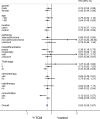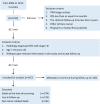Exploring the medication duration based on the effect of traditional Chinese medicine on postoperative stage I-III colorectal patients: a retrospective cohort study
- PMID: 28086238
- PMCID: PMC5355114
- DOI: 10.18632/oncotarget.14567
Exploring the medication duration based on the effect of traditional Chinese medicine on postoperative stage I-III colorectal patients: a retrospective cohort study
Abstract
Purpose: To clarify the effect of tradional Chinese medicine (TCM) on different stage patients and to explore medication duration based on survival analysis.
Results: 523 and 294 patients were respectively in the TCM group and the control group. For all patients, 6-year disease-free survival (DFS) was 57.6% after TCM and 46.6% after non-TCM (p = 0.0006). 6-year DFS for patients with stage I disease in the TCM group was 79.5% compared with 89.1% in the control group (p = 0.65). For patients with stage II disease, 6-year DFS was 63.1% in the TCM group compared with 50.2% in the control group (p = 0.054), and for patients with stage III disease, it was 43.3% in the TCM group compared with 22.0% in the control group (p = 0.0000).
Materials and methods: Data for patients with stage I-III disease between 2004 and 2013 were retrieved for this study, who underwent TCM after surgery were in the TCM group and the others were in the control group. Clinic appointments or phone were used to collect data by research assistants. Survival data were collected on Nov 2015 from the database, which is continuously updated by the researchers.
Conclusions: TCM is associated with significantly improved disease-free survival, in particular for patients with stage III disease. Among of these, TCM is not necessary for patients with stage I disease, and postoperative patients with stage II disease should be recommended to take 2 years of TCM. For patients with stage III disease, adherence to medication of TCM during the 6-year follow-up is worthy of being recommended.
Keywords: colorectal cancer; medication duration; traditional Chinese medicine.
Conflict of interest statement
The authors have no conflicts of interest.
Figures




References
-
- Siegel RL, Miller KD, Jemal A. Cancer statistics, 2016. CA Cancer J Clin. 2016;66:7–30. - PubMed
-
- Chen W, Zheng R, Baade PD, Zhang S, Zeng H, Bray F, Jemal A, Yu XQ, He J. Cancer statistics in China, 2015. CA Cancer J Clin. 2016;66:115–32. - PubMed
-
- Sung JJ, Lau JY, Goh KL, Leung WK. Increasing incidence of colorectal cancer in Asia: implications for screening. Lancet Oncol. 2005;6:871–6. - PubMed
-
- Wilhelmsen M, Kring T, Jorgensen LN, Madsen MR, Jess P, Bulut O, Nielsen KT, Andersen CL, Nielsen HJ. Determinants of recurrence after intended curative resection for colorectal cancer. Scand J Gastroenterol. 2014;49:1399–408. - PubMed
-
- Ling CQ, Wang LN, Wang Y, Zhang YH, Yin ZF, Wang M, Ling C. The roles of traditional Chinese medicine in gene therapy. J Integr Med. 2014;12:67–75. - PubMed
Publication types
MeSH terms
LinkOut - more resources
Full Text Sources
Other Literature Sources
Medical

